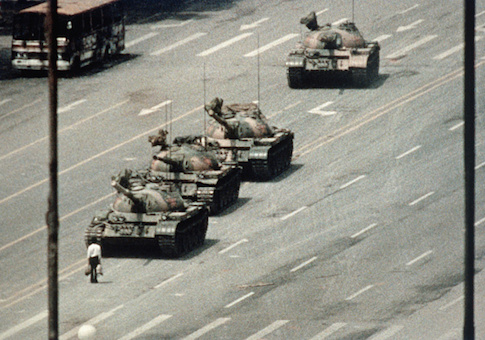To this day, exactly 30 years later, it remains the example of courage, an instance of David versus Goliath—though, in this case, the contrast was exponentially starker. On June 5, 1989, an unidentified Chinese man, whose fate remains a mystery, stood alone, unarmed, in front of a column of tanks leaving Tiananmen Square in Beijing. Just hours earlier, on June 4, the Chinese government had sent the military to the square to crush peaceful, pro-democracy protests led by students, who denounced the Communist Party's corruption and authoritarian rule and sought greater freedoms for the Chinese people. The military ended up massacring anywhere from hundreds to thousands of demonstrators and bystanders in a show of force that China's leaders have tried to erase from history. And yet, "Tank Man," as the unknown protester is known, was undeterred, temporarily blocking the tanks from advancing.
Wearing a white shirt and holding two shopping bags, the man brought the tanks to a halt, staring down the embodiment of brutality and oppression without flinching. When the lead tank tried to move past Tank Man, he shuffled his feet to obstruct its path. The incident, captured on video, is truly inspiring. And the man, immortalized for his bravery, has become a symbol of freedom. The world has a moral obligation to remember him—indeed, to remember everyone who demonstrated against China's totalitarian regime in 1989. Their spirits live on; the cause of freedom is eternal, a fundamental part of the human experience.
The fate of Tank Man may be an open question, but there is another Tank Man carrying on his legacy today, similarly standing tall—though not unarmed—in the path of the daunting Chinese juggernaut. This Tank Man, which also refuses to submit to Beijing's oppression, is not a person, nor is it even in China, but its fate is still tied to the future of the Chinese people. What could I possibly be talking about? Taiwan, the island that holds the moral and strategic keys to undermining the Communist Party's cruelty inside China and its belligerence abroad.
Only the Taiwan Strait, just 112 miles wide, separates China from Taiwan, which is obviously the smaller and weaker of the two, yet in the line of Chinese firepower. Indeed, China is hell-bent on reunifying Taiwan with the mainland. In a report released in January, the Defense Intelligence Agency identified Beijing's desire to "compel Taiwan's reunification with the mainland and deter any attempt by Taiwan to declare independence" as the "primary driver for China's military modernization." That same month, Chinese President Xi Jinping threatened to use military force against Taiwan. "China must be, and will be reunified," he said. "We do not forsake the use of force." China understands that controlling Taiwan would bolster its efforts to make the South China Sea into a "Chinese lake," and that Taiwan is the critical point of the so-called "first island chain," the first line of archipelagos off the east Asian continental coastline. China believes Taiwan is where it could break through the chain of America's allies to challenge American dominance in the Pacific. Like Tank Man, Taiwan is a smaller force blocking the Chinese military's path.
Taiwan is also a vibrant democracy, one that simply wants to thrive as a peaceful, prosperous country without the looming threat of a Chinese invasion. China's obsession with reunification, however, poses an existential threat to this vision. Beijing seeks to force the Taiwanese people to obey an autocrat in Beijing rather than elect their own leaders, suffocating every vestige of Taiwanese democracy and independent culture along the way. Taiwan's very existence, its determination both to persevere and to prosper in this hostile environment, defies the Communist Party. Indeed, the island is a symbol of freedom in the face of Chinese oppression. But Taiwan also poses a more concrete challenge to China. Indeed, Taiwan threatens the survival and legitimacy of the Chinese government. As I wrote in April: "How can the Communist Party rule with any legitimacy and promote its model of governance when a tiny island can prosper just a few miles away as an independent democracy?" The Chinese government has been shamefully successful at crushing dreams of democracy within China, but those dreams still exist, even if they are not public. Supporting Taiwan is a practical way to help make those dreams a reality. Like Tank Man, Taiwan is standing tall—and willing to do so alone—against the Communist Party's authoritarianism, and in support of democratic values.
As the civilized world remembers Tank Man, it should support Taiwan, which similarly represents freedom and the most admirable traits of the human spirit. Standing up for Taiwan is standing up for the oppressed Chinese people. If Taiwan falls, then the light of hope for the Chinese people to one day be free dims that much more. But if Taiwan continues to succeed and to grow in stature, then that light will grow brighter.
Ultimately, China may be stronger, but it fears Taiwan, as it fears its own people. Guns and money are of course necessary for other countries to deter and counter Beijing's ambitions, but nothing would make Chinese leaders tremble like another Tank Man. Let us help Taiwan be a source of inspiration for that future hero, who will be part of a much broader movement.
